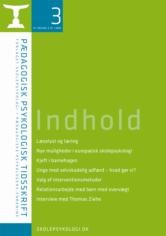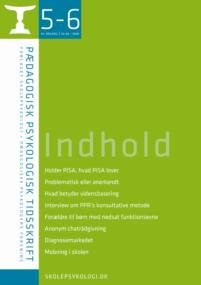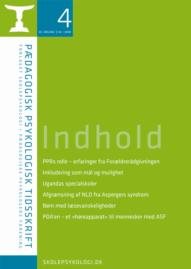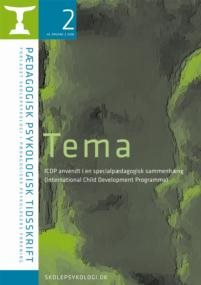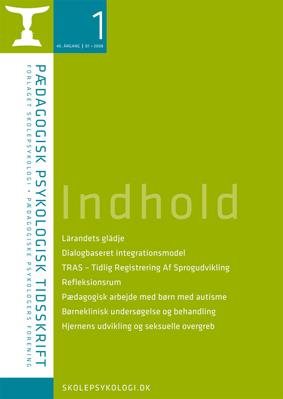Beskrivelse
Andersen, Bent, B. (Lecturer at School of Education, University of Aarhus).
The Joy of Reading and Learning. How do School Psychologists Anticipate Problems?
Pædagogisk Psykologisk Tidsskrift, 2008, Vol. 45, 179-185.
The roles of school psychologists are currently expanding. General preventive efforts are not enough for all pupils. When that is the case school psychologists should participate in anticipatory measures. Three developmental projects focusing on reading are presented. The results imply that s.p.s can contribute substantially in three areas: strategies in the use of synthetic speech and word prediction, pupil self esteem, and supply of extra resources. – Bjørn Glæsel.
Glæsel, Bjørn (School psychologist, member of the NEPES steering committee).
New Possibilities in European School Psychology – Cooperation through NEPES.
Pædagogisk Psykologisk Tidsskrift, 2008, Vol. 45, 186-190.
In July 2007 EFPA decided to institute NEPES, Network of European Psychologists in the Educational System. Its goals are: to further professional development and cooperation among school psychologists in Europe. To prepare the way for pedagogical psychological expertise in all European countries. To assist the development of optimal learning environments for all pupils and students in Europe. Its methods are primarily: the construction of a network for school psychologists et al., to participate in and support developmental projects, and to develop and gather knowledge about school psychology.- Bjørn Glæsel.
Børnich, Elisabeth (Special teacher and master of psycho-social learning difficulties).
Scolding in Kindergarten.
Pædagogisk Psykologisk Tidsskrift, 2008, Vol. 45, 191-208.
Drawing on own interview research, and Danish researcher Erik Sigsgaard, the author discusses scolding of small children. Teachers seldom state their reasons for scolding, but environmental factors in the kindergarten may provoke feelings of stress that increase the tendency to scold children. The children’s reactions to scolding differ in accordance with the »history« of each child, and the severity and the timing of the scolding; but, the more troubles a child has, the more he is scolded. What kind of day care institutions do we wish for in order to prevent or at least minimize scolding, and how do we optimize the fulfillment of the developmental needs of all children? – Bjørn Glæsel.
Petersen, Jytte (Psychologist, Videnscenter for Rådgivning og Specialpædagogik, Aarhus).
Self Mutilation Among Adolescents.
Pædagogisk Psykologisk Tidsskrift, 2008, Vol. 45, 209-222.
A growing proportion of adolescents and especially girls cut or hurt themselves otherwise. 15% seems to be a valid estimate of the prevalence. Bo Møhl’s research documents a.o. that feelings of anger towards others among the youngsters are reported by 56% of them before the self mutilation, but only 2% afterwards. Anger towards oneself falls from 35% to 5%. Possible reasons for self mutilation are discussed. It is recommended that stress and lack of support are seen as more important than biological and genetic causes; that a main focus should be to optimize feelings of well being in schools and clubs etc., and that children should be taught and stimulated to develop resilience; and that some youngsters need a special care and a visible, quiet, and safe framework. – Bjørn Glæsel
Nielsen, Jørn (Clinical psychologist, ph.d. Vejle).
What Kind of Intervention?
Pædagogisk Psykologisk Tidsskrift, 2008, Vol. 45, 223-240.
When psychologist face a new task, they have a variety of choices. In order to manage the context, the psychologist should consider her focus: individual, family, ecology, or society. And the methods that should be chosen: individual examination? Therapy of the individual, the group, the family? Supervision? Teaching? Organizational development? Our present dilemma is: an evidence based discourse, focusing on facts and measurement, or a reflexive discourse, seeing reflexitivity as a prerequisite for humanity. But, the final choice of intervention is of an ethical nature. Ethics are about relations and responsibility. The methods should be seen in the light of new understanding , such as Bateson’s transdisciplinary understanding: inquiry driven more than discipline driven, meta-understanding, and examinations seen as creative processes combining rigor with imagination. – Bjørn Glæsel.
Meiling, Line (Psychologist).
You Surely Do Not Lose Weight From Just Talking?
Pædagogisk Psykologisk Tidsskrift, 2008, Vol. 45, 241-253.
The incidence of overweight among children and adolescents has risen considerably. Typical intervention focuses on exercise and food, but often without results. Based on experience from a project involving children and their families, it becomes necessary to understand overweight as something else. For some children the origin is insecure or negative experiences. More positive experience of oneself may form the basis of a change of habits, so that a healthier life and a loss of weight may be obtained. Therefore an relational effort must be an integrated part of interventions. This is why psychologists with knowledge of development and with therapeutic competence are needed in this line of work. – Line Meiling.
Pedersen; Jes, Stein (Journalist at Denmark Radio 2).
Thomas Ziehe – An Absolute Super Star of Education.
Pædagogisk Psykologisk Tidsskrift, 2008, Vol. 45, 254-260.
A radio interview from March 25., 2007. Ziehe’s book, »Islands of Intensity in an Ocean of Routine«, formed the basis for the interview. Among the many questions and answers, two are selected as especially significant. Question: What do you do about self interested adolescents who want nothing to do with knowledge, possessed by their parents? Answer: The problem is that they are so engaged in our very dominant pop culture that it is difficult for teachers to open their eyes to anything else. Q: How can teachers create an island of intensity? A: Routine is o.k. – it is the foundation, and teachers should not feel guilty about that. However, intensity does occur. It is not about proximity to the teacher; she is not a friend. Intensity is an esthetic quality to be experienced, something different from daily life at home. – Bjørn Glæsel.
